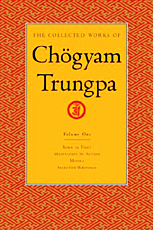"There is a story in Tibet concerning two brothers, one of whom had ninety-nine yaks while the other had only one yak. The poor brother was quite content with his one yak. He was quite happy and thought he had great wealth. He had one yak and that was really all he needed. It was quite sufficient and he wasn't particularly afraid of losing it. In fact his enjoyment of owning it was greater than his fear of losing it, whereas the other one was always very afraid of losing his yaks. He always had to look after them, and generally you find in the highlands of Tibet that there are a lot of wolves and Himalayan mountain bears, and the yaks quite often die through the hardships of winter. There are far more obstacles there than in this part of the world when it comes to looking after animals. So one day the rich brother thought, 'Well, I think I'll ask my brother a favor." You see, he was not only afraid of losing his yaks, he was also very keen on accumulating more of them. And he went to the other brother and said, "Well, I know you have only one yak, which doesn't make much difference to you. So if you didn't have one at all it wouldn't really matter very much. But if you give me your yak then I will have a hundred yaks, which means a great deal to me. I mean a hundred yaks is really something. If I had that much I would really be somebody rich and famous.' So he asked the favor. And the other brother gave up the yak quite easily. He didn't hesitate; he just gave it. And this story became proverbial in Tibet to illustrate that when someone has a lot he wants more, and when someone has less he is prepared to give.
"So there is this possessiveness, this psychological hunger. And this relates not only to money and wealth but to the deep-seated feeling of wanting to possess, wanting to hold on to things, wanting things to definitely belong to you. For example, supposing you are window shopping. One person might be unhappy all the time, and when he sees things he likes, this always produces a kind of pain in his mind because he is thinking, 'If only I had the money, I could buy that!' So all the time as he is walking through the shops this hunger produces great pain. Whereas another person may enjoy merely looking. So this wanting to own, wanting to possess and not being prepared to give out, is not really a weakness for any particular thing. It is more generally wanting to occupy oneself with something, and if you have lost or lose interest in that particular thing then you always want to substitute something else in its place. It isn't particularly that you can't manage without a motorcar or central heating or whatever it may be. There is always something behind that, something fundamental, a kind of wanting to possess, wanting to own, which is always changing and developing and substituting one thing for another. So that is the real weakness — though not exactly weakness, but more a kind of habit that one tends to form through a neurotic process of thoughts. The whole thing boils down to this overlapping of thoughts which goes on all the time in our minds. We never allow anything to really happen or take place in our mind. One thought comes and almost before we finish that another one comes in and overlaps it and then another. So we never allow any gap which would permit us to be free and really digest things. Therefore it becomes a continual demand, a continual process of creating and wanting to own. And that is why one has to develop this generosity of really opening oneself.”
